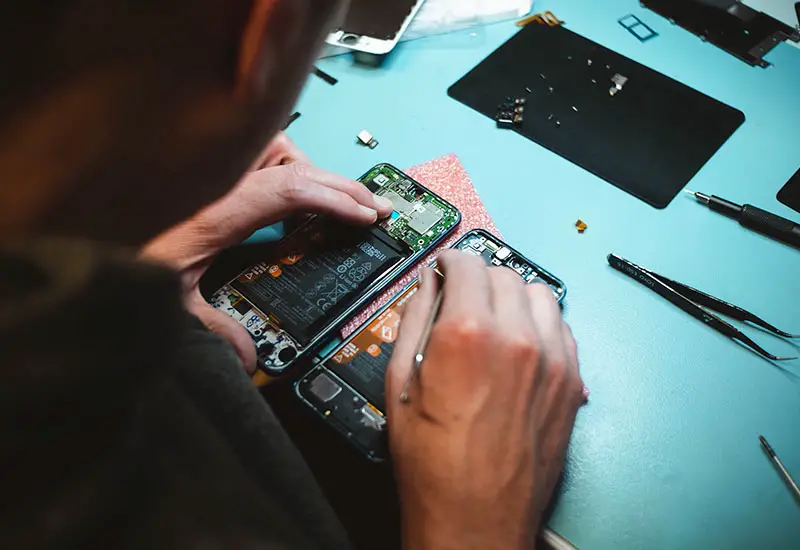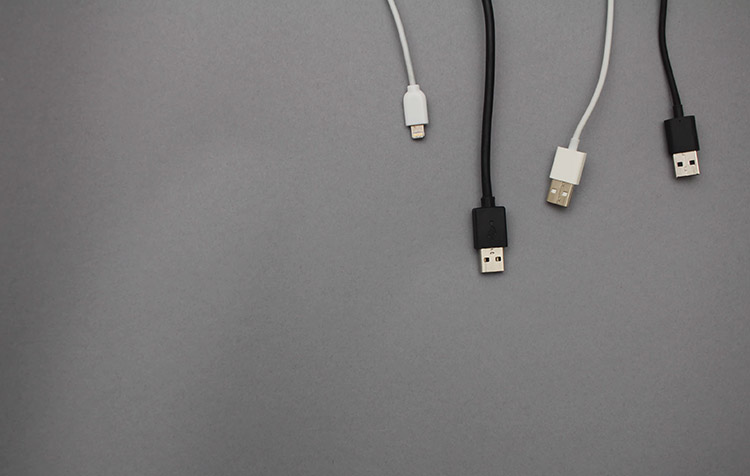You want to avoid electrical waste and know more about sustainability in electrical appliances? Then you've come to the right place! Headphones, refrigerators, smartphones, computers... our households are full of electronic devices. It's no wonder that every German produces around 19.4 kilograms of e-waste per year - and that our throwaway culture puts us far above the global average.₁ Both here at home and globally, the trend is rising sharply.₂ And that's despite the fact that the production and handling of technology has countless ecological and social consequences.
In this article, I would like to introduce you to how you can deal more sustainably with electrical appliances in order to avoid electronic waste. Let's go!
In advance you can find here already a short Overview about the contribution:
- Make yourself aware of ecological and social consequences
- Use devices as long as possible
- Repair technology instead of buying it new
- Take care of your technology
- Don't keep buying the latest electronics
- Sell or give away unused and broken equipment
- Consciously abandon your technique once in a while
- Dispose of defective old equipment properly
- Prefer used electrical appliances
- When buying new, go for fair, energy-efficient quality goods
1. Make yourself aware of ecological and social consequences
In 2019, 53.6 million tons of e-waste were generated worldwide - and around 2 million tons of e-waste were disposed of in Germany. Especially the Recycling, but also Production, material and use electronic products cause massive environmental problems and social ills.
For the production of smartphones, laptops and other devices are rare earths, critical metals and others natural resources In addition, CO2 is emitted in the factories, which further increases global warming. Moreover, a large part of our scrap ends up in Ghana, West Africa, where the valuable but often also toxic raw materials are primarily Child labor is to be recovered from the old equipment.₄
Worldwide, the Recycling rate for electronic waste is only 17.4 percent - the rest ends up in landfills or incinerators. In Germany, at least half of electrical waste is recycled - but that doesn't change the fact that we produce far too much waste in absolute terms. So there is huge potential for a more resource-conserving and respectful approach to our technology. The WHY is clear. Now it's a matter of HOW!
2. Use devices as long as possible
The longer you use your smartphone, computer, refrigerator, or TV, the fewer resources it requires and the fewer social problems you can expect. So consciously try to make your devices last longer. the longest possible service life have. You can find out exactly how this can work in the other tips for avoiding electronic waste. In the end, your own wallet will be happy about it - and you can save money through sustainability.
3. repair technology instead of buying it new

This is one of the reasons why we live in a spoiled Throwaway Society, because we can buy appliances 24 hours a day, 7 days a week at low prices. For example, if a toaster breaks down, it will be often bought new for convenience - and the old device ends up in the trash.
But in the sense of the Zero Waste Lifestyle is to Spare parts and repair the device - thus saving nature as well as your own wallet. Even if you're not very handy, you can still do it yourself. bring for repair.
4. be careful with your technology
Sustainability in electrical appliances also means treating them with appreciation. A Protective cover for smartphone can, for example, help to ensure that it remains intact and functional for as long as possible. Basically, I also advise you to only switch on and use technology when it is really necessary.
5. don't buy the latest electronics all the time
Just make yourself aware of which Privilege it is to own so many tech gadgets in the first place - and show appreciation for the things you do have. Also, ask yourself about any potential new purchase: do i really need this? Or is it possibly just an impulse purchase - and the device will be in the corner again tomorrow? You don't have to wait for hours in front of the store of an American hardware and software developer to pay a lot of money for the latest of the latest just because "everyone else" wants it, too.
Think and live a little more minimalist - and rather invest your well-earned income in things that really enrich your life.
6. sell or give away unusable equipment
For a sustainable approach to electronics, what happens to them when they are no longer needed or no longer function is also crucial.
An external hard drive or an old PC won't do? Then sell it or give it away on eBay Classifieds to a hobbyist who might see more value in the technology.
You got a new cell phone as a gift and don't need the old one anymore? Then sell your old device at the flea market or on the Internet. There will always be someone who will be enormously happy about it! In the end, everyone benefits - the environment, the recipient and yourself.
7. consciously do without technology

Maybe you know the situation: your smartphone battery is empty - and with it, your favorite navigation device in all situations has gone bye-bye. Suddenly you're on your own and realize how dependent you actually are on the thing. A moment of insight that shows you that it's time for a change. Digital Detox is.
Just consciously do without technical devices for once, Whenever possible - and only use them when there is no longer an alternative. This is another valuable tip for more sustainability in electrical appliances.
Tip: I've also written you a separate article on how to create a possible Combat cell phone addiction can!
8. properly dispose of defective old equipment
At some point, every electronic device reaches the end of its life. For a sustainable use of the devices it is important to consider the Dispose of electronic waste properly. Due to their valuable and partly toxic substancesHowever, you must not dispose of them in household waste - but only at recycling centers and electrical retailers. This way, the devices and their resources can be recycled and used as sensibly as possible.
9. prefer used electrical appliances
Technology is not only good when it's new! In order to avoid buying a new device and creating more electrical waste, you should consciously opt for used devices. Simply look again at flea markets and second-hand portals for appropriate offers and save your wallet. Often, an old smartphone might have a small scratch on the display - but it's not worth it. as long as it works properly, this is definitely something that can be tolerated.
10. when buying new, go for fair, energy-efficient quality goods
The only option is to buy new? Then make sure you buy environmentally friendly, efficient and fair technology. The "Blue Angel" is for example a Environmental sealwhich you can use to identify sustainable, fair and low-emission goods. The process from production to disposal is evaluated. Also the "TCO label" and the "Energy Star Label" are suitable.
You can see how energy-efficient new refrigerators or televisions are on the EU energy label (from G - A+++). Ultimately, the necessary new purchase of electronics is the opportunity to permanently save electricity in the household.
Notice: Of course, a freezer that is 30 years old but still in working order will also have to be replaced at some point because it is very likely to consume many times the energy of modern counterparts. Basically, it has to be weighed up in each individual case whether replacing a functioning old product is actually more sustainable.
Sustainability in electrical appliances? no problem!

So when it comes to the sustainable use of electronics, there is something take a closer look! But your motivation to avoid electrical waste, waste of resources and social problems like child labor should be higher than ever after this article. Not least because this project is quite uncomplicated - and you will also benefit from it yourself.
I hope that this article about sustainability in electrical appliances has helped you. Do you have any questions or tips on this topic? Then I look forward to your comments!
Stay sustainable,

PS.: Not only with your technical devices you can conserve resources in everyday life. In the linked post you'll learn what else you can do! Have fun!
References:
₁ Mathias Brandt: Every German produces 19.4 kg of e-waste (as of Sept. 16, 2020), available at https://de.statista.com/infografik/12272/die-zehn-laender-mit-dem-groessen-elektroschrott-aufkommen. [09.12.2021].
₂,₃ Statista Gmbh: Generation of e-waste worldwide in the years from 2014 to 2019 and a forecast until 2030 (as of July 2020), available at https://de.statista.com/statistik/daten/studie/792541/umfrage/erzeugung-von-elektroschrott-weltweit. [09.12.2021].
₄ Barbara Lich: How you can avoid e-waste (as of March 2017), available at https://www.geo.de/geolino/natur-und-umwelt/elektroschrott-vermeiden-und-entsorgen-recycling. [09.12.2021].






